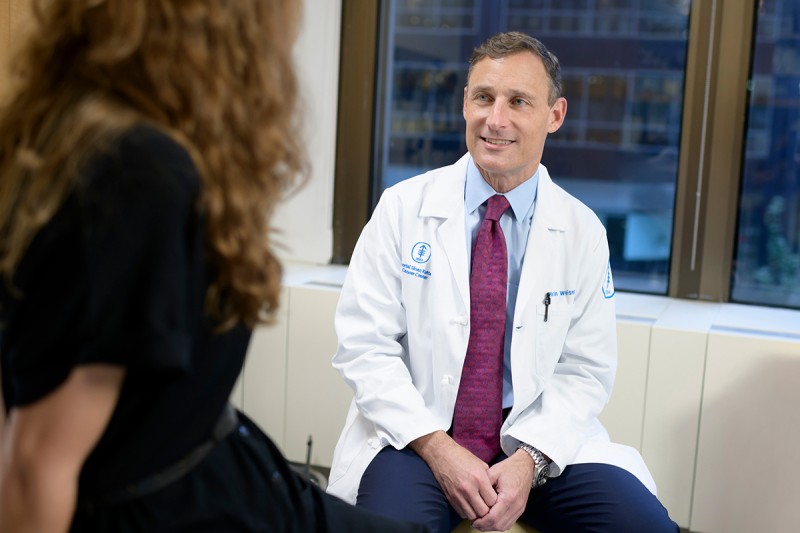
Physicians at Memorial Sloan Kettering Cancer Center (MSK) have developed and validated clinical calculators to help patients estimate their likelihood of avoiding a recurrence after treatment for colorectal cancer. The newest calculator can help patients decide whether to proceed with surgery immediately following chemotherapy and radiotherapy for rectal cancer, or to undergo watch-and-wait management instead.
The original rectal cancer calculator, described in a 2021 study published in JAMA Network Open, (1) proved to be an effective tool for estimating the likelihood of avoiding a recurrence after surgery. The calculator was developed using data from 1069 patients who underwent treatment at MSK, and its accuracy was confirmed using data from 331 patients who underwent treatment at Washington University’s Siteman Cancer Center.
In a subsequent study, published in JAMA Network Open in 2022, (2) the team expanded the calculator’s applicability to include patients who did not undergo surgery as planned because they showed no sign of cancer after chemotherapy and radiotherapy. Using data from 302 patients who underwent treatment at MSK, the study showed that the calculator can estimate the likelihood of avoiding a recurrence for patients who enter watch-and-wait management as reliably as for patients who undergo immediate surgery. It also showed that the outcomes of patients who underwent surgery with some delay were comparable to the outcomes of patients who underwent immediate surgery.
“We originally built our calculator within the paradigm of chemotherapy, radiation, and surgery,” says Martin R. Weiser, MD, a surgeon at MSK and an academic leader in the field of rectal cancer. “However, over the past few years, a new treatment paradigm has emerged. In this alternative approach, we closely monitor patients who undergo chemotherapy and radiotherapy, and based on their individual characteristics, we determine what combination of treatments—which may or may not include surgery—would be most effective for them.”
The calculator is both a valuable tool for physicians and an empowering resource for patients. By entering several variables into the calculator, which is freely available on MSK’s website, patients can obtain a predictive estimate that can help them decide—in consultation with their physician—whether to proceed with surgery after preoperative therapy or to safely hold off.
“The information provided by the calculator can help patients understand risk, which is always helpful. It gives them agency for the rest of their life,” says Dr. Weiser. “The fact that the calculator is dynamic allows you to check predictions along your pathway of treatment.”
In addition to the calculator for the likelihood of avoiding rectal cancer recurrence, Dr. Weiser’s team has developed a calculator for the likelihood of avoiding colon cancer recurrence, which is described in a study published in the Journal of Clinical Oncology in 2021. (3) Based on data from 1095 patients who underwent treatment at MSK and validated using data from 299 patients who underwent treatment at Siteman Cancer Center, the calculator provides more individualized predictions compared with estimates based on conventional disease staging. “The inclusion of molecular variables in the colon cancer calculator improves predictive accuracy, which is very exciting,” says Dr. Weiser.
The calculators developed by Dr. Weiser’s team represent an important advancement not only for treatment of colorectal cancer, but also for individualizing cancer treatment in general. With the incorporation of molecular genetics and other powerful technologies, cancer diagnosis and treatment continue to evolve, and the availability of treatments tailored to the individual patient and to the specific characteristics of their disease will continue to grow.
Dr. Weiser discloses the following relationships and financial interests: Ultimate Opinions in Medicine LLC and UptoDate.


